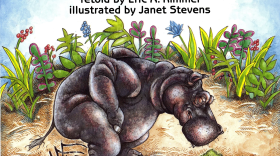Sarah Debacher
Host of Little Voices, Big IdeasSarah DeBacher is the Director of Curriculum and Content Development for PRIME TIME Family Reading at the Louisiana Endowment for the Humanities. Originally from Atlanta, she has lived in New Orleans for 23 years, where she has taught English and writing at the University of New Orleans, Tulane University, and the Bard Early College program. Her publications include “Making it Up as We Go: Students Writing and Teachers Reflecting on Post-K New Orleans” (Reflections: A Journal of Writing, Service Learning and Community Literacy, 2008), “First, Do No Harm: Teaching Writing in the Wake of Traumatic Events” (Composition Forum, 2016), and several essays on living in New Orleans. She is mother to two young sons, three chickens, two cats, and a rescue dog.
My favorite children’s book of the moment is The Big Orange Splot by Daniel Pinkwater. It speaks to how the creative resistance of one person, Mr. Plumbean, inspires others to embrace art in their everyday lives. Plus, it’s got some subversive jokes that only the grownups will get.
-
-
-
On this episode of ‘Little Voices, Big Ideas’, a moooving discussion about Doreen Cronin and Betsy Lewin’s Caldecott Award winning book, ‘Click Clack, Moo: Cows That Type.’
-
The week’s ‘Little Voices, Big Ideas’ explores how ‘Granddaddy’s Turn: A Journey to the Ballot Box’ can shine a light on a turbulent period of American history–and on the promise of one voice, one vote, through the discussion of this book.
-
The second season of Little Voices, Big Ideas, kicks off with a SPLOT. Daniel Manus Pinkwater’s 1977 book, The Big Orange Splot, highlights a key tension encountered by all of us living in a shared democracy: that of individual freedom versus collective responsibility. Where does one end and the other begin?
-
In this episode, we explore what makes this tale so endearing--and enduring--and why Where the Wild Things Are allows parents and children to have tame talks about the pain of punishment, and the healing power of the imagination.
-
Anansi the spider, the thieving trickster at the heart of Eric Kimmel’s Anansi and the Moss-Covered Rock, offers up an opportunity for pushing past mere moralizing toward more nuanced conversations about when tricks cross over into deception territory--and even when a seemingly harmless little lie may not be seen as such by others.
-
In this episode, we discuss Jacqueline Woodson’s The Other Side, a beautifully illustrated picture book set during the segregation era--and how to use it to invite safe, non-didactic conversations about how our racial differences have divided us, and how we can take the conversation forward.
-
In Episode 3 of “Little Voices, Big Ideas,” we hear from the big bad wolf, himself, in John Scieszka’s The True Story of the Three Little Pigs, and offer strategies for encouraging kids to think critically before jumping to conclusions.
-
Episode 2 of “Little Voices, Big Ideas,” makes the case for discussing the big ideas found in the book that everyone loves to love--or loves to hate--Shel Silverstein’s The Giving Tree.











